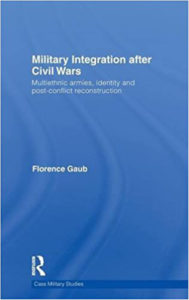
Military Integration after Civil Wars: Multiethnic Armies, Identity and Post-Conflict Reconstruction
Florence Gaub
Routledge (2010)
Rs12,814
This book examines the role of multiethnic armies in post-conflict reconstruction, and demonstrates how they can promote peacebuilding efforts.
The author challenges the assumption that multiethnic composition leads to weakness of the military, and shows how a multiethnic army is frequently the impetus for peacemaking in multiethnic societies. Three case studies (Nigeria, Lebanon and Bosnia-Herzegovina) determine that rather than external factors, it is the internal structures that make or break the military institution in a socially challenging environment. The book finds that where the political will is present, the multiethnic military can become a symbol of reconciliation and coexistence. Furthermore, it shows that the military as a professional identity can supersede ethnic considerations and thus facilitates cooperation within the armed forces despite a hostile post-conflict setting. In this, the book challenges widespread theories about ethnic identities and puts professional identities on an equal footing with them.
The book will be of great interest to students of military studies, ethnic conflict, conflict studies and peacebuilding, and IR in general
Florence Gaub is a Researcher and Lecturer at the NATO Defence College in Rome. She holds a PhD in International Politics from Humboldt University, Berlin.
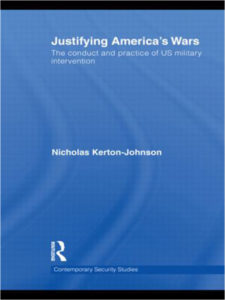
Justifying America’s Wars; The Conduct and Practice of US Military Intervention
Nicholas Kerton-Johnson
Routledge (2011)
Rs12,814
This book examines the justifications for, and practice of, war by the US since 1990, and examines four case studies: the Gulf War, Kosovo, Afghanistan and Iraq.
The author undertakes an examination of presidential speeches and public documents from this period to determine the focal points on which the respective presidents based their rhetoric for war. The work then examines the practice of war in the light of these justifications to determine whether changes in justifications correlate with changes in practice. In particular, the justificatory discourse finds four key themes that emerge in the presidential discourses, which are tracked across the case studies and point to the fundamental driving force in US motivations for going to war. The four key themes which emerge from the data are: international law or norms; human rights; national interest; and egoist morality (similar too, but wider than, ‘exceptionalism’). This analysis shows that 9/11 resulted in a radical shift away from an international law and human rights-focused justificatory discourse, to one which was overwhelmingly dominated by egoist-morality justifications and national interest.
This book will be of much interest to students of US foreign policy, humanitarian intervention, Security Studies, and IR theory.
Nicholas Kerton-Johnson is Chief Executive Officer of The Ephesus Initiative.
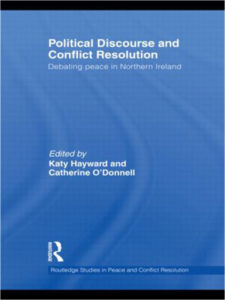
Political Discourse and Conflict Resolution; Debating Peace in Northern Ireland
Eds Katy Hayward, Catherine O’Donnell
Routledge (2011)
Rs12,814
This book offers new insights into the close relationship between political discourses and conflict resolution through critical analysis of the role of discursive change in a peace process.
Just as a peace process has many dimensions and stakeholders, so the discourses considered here come from a wide range of sources and actors. The book contains in-depth analyses of official discourses used to present the peace process, the discourses of political party leaders engaging (or otherwise) with it, the discourses of community-level activists responding to it, and the discourses of the media and the academy commenting on it. These discourses reflect varying levels of support for the peace process – from obstruction to promotion – and the role of language in moving across this spectrum according to issue and occasion. Common to all these analyses is the conviction that the language used by political protagonists and cultural stakeholders has a profound effect on progression towards peace.
Bringing together leading experts on Northern Ireland’s peace process from a range of academic disciplines, including political science, sociology, linguistics, history, geography, law, and peace studies, this book offers new insights into the discursive dynamics of violent political conflict and its resolution.
Katy Hayward is Lecturer in Sociology at Queen’s University Belfast.
Catherine O’Donnell is an independent scholar. She was an IRCHSS post-doctoral fellow at the Humanities Institute of Ireland, University College Dublin, 2005-2007.
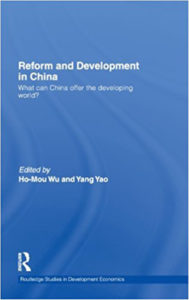
Reform and Development in China: What Can China Offer the Developing World
Yang Yao and Hu-Mou Wu
Routledge (2010)
Rs15,217
Between 1978 and 2006, GDP growth in China maintained an annual average rate of 9.7%, meaning the Chinese economy increased by more than twelve times. This was achieved with quite unorthodox approaches to reform and development as China has adopted a gradualist approach to adopting key institutions, as well as modifying and experimenting with traditional recipes for economic growth.
This collection brings together key researchers in the field from Asia, US, Europe and Australia to discuss how China has managed to push forward reforms in the face of political resistance, how the Chinese economy has maintained growth within an imperfect institutionalist environment and how the Chinese government remains effective when it relinquishes its power to the market. Specific emphasis is paid to the relevance of China’s experiences to other developing countries. This valuable contribution to the study of China’s economy covers a wide range of topics, including the historical foundations of the 30 years of reform, law and development in China, foreign direct investment, poverty reduction, market integration, income distribution, social protection, as well as demographics and population.
Reform and Development in China finds both unique elements to the Chinese experience and elements which can be applied to other developing countries. In particular, China’s gradualism in economic reform, strong leadership, and emphasis on inclusive development are singled out to be potentially transferable to other developing countries. This collection will be of interest to postgraduate students and researchers as well as practitioners in development economics.
Yang Yao and Hu-Mou Wu are Professors of Economics at the China Centre for Economic Research at the University of Peking in Beijing, China.
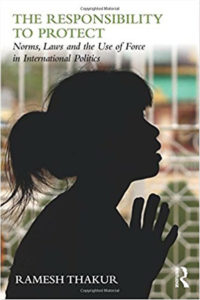
The Responsibility to Protect: Norms, Laws and the Use of Force in International Politics
Ramesh Thakur
Routledge (2011)
Rs14,416
This volume is a collection of the key writings of Professor Ramesh Thakur on norms and laws regulating the international use of force.
The adoption of the Responsibility to Protect (R2P) principle by world leaders assembled at the UN summit in 2005 is widely acknowledged to represent one of the great normative advances in international politics since 1945. The author has been involved in this shift from the dominant norm of non-intervention to R2P as an actor, public intellectual and academic and has been a key thinker in this process. These essays represent the author’s writings on R2P, including reference to test cases as they arose, such as with Cyclone Nargis in Myanmar in 2008.
Comprising essays by a key thinker and agent in the Responsibility to Protect debates, this book will be of much interest to students of international politics, human rights, international law, war and conflict studies, international security and IR in general.
‘In these penetrating essays, Ramesh Thakur lays out not only the dilemmas but also the ways that the emerging norm of the responsibility to protect permits critics?be they from the global South or North?to pursue their pragmatic and principled impulses to come to the rescue.’ - Thomas G. Weiss, The Graduate Center, CUNY.
‘In this powerful collection of essays spanning two decades of his writings, Ramesh Thakur demonstrates a deep and abiding commitment to protecting victims of atrocity crimes while navigating through the often competing pulls of North-South and scholar-practitioner perspectives,’ says Martti Ahtisaari, chairman of the Crisis Management Initiative.
‘Ramesh Thakur’s essays comprehensively track the evolution and impact of the doctrine that has begun to fundamentally change the way the world thinks about mass atrocity crimes. This book will intrigue, and be of real value to, both practical policymakers and academics interested in normative and conceptual issues,’ writes Gareth Evans, the co-chair of the International Commission on Intervention and State Sovereignty.
‘A good overview of the debates around humanitarian intervention associated with the NATO campaign in Kosovo, the genesis of the R2P doctrine and the doctrine’s progressive development,’ says International Affairs.
‘For those not familiar with Thakur’s work, this book undoubtedly represents an R2P tour de force and a ‘greatest hits’ collection that is worthy of a place in any R2P collection,’ writes Adrian M. Gallagher of the University of Leicester in the Political Studies Review, Vol 10:3, Sept. 2012
Ramesh Thakur is Professor of International Relations in the Asia-Pacific College of Diplomacy, Australian National University and Adjunct Professor in the Institute for Ethics, Governance and Law at Griffith University in Brisbane, Australia. He was a Commissioner for the International Commission on Intervention and State Sovereignty (ICISS), and one of the principal authors of their report The Responsibility to Protect (2001). He was also Senior Advisor on Reforms and Principal Writer of the United Nations Secretary-General’s second reform report (2002). He is author or editor of over thirty books and 300 articles and book chapters.

